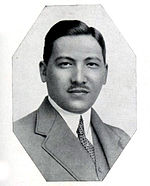Francisco Alonso Liongson, Date of Birth, Place of Birth, Date of Death
TweetFrancisco Alonso Liongson
Filipino writer and lawyer
 Date of Birth: 01-Jul-1896
Date of Birth: 01-Jul-1896
 Place of Birth: Bacolor, Luzon, Philippines
Place of Birth: Bacolor, Luzon, Philippines
Date of Death: 14-May-1965
Profession: writer
Nationality: Philippines
Zodiac Sign: Cancer 
About Francisco Alonso Liongson
- Francisco Alonso Liongson (1896–1965) lived in one of the most exciting periods of Philippine history.
- He was born into an Ilustrado family from Pampanga, Philippines at the turn of the 20th century and raised with the revolutionary values of an emerging Philippine identity which held freedom, justice, honor, patriotism and piety sacred.
- He witnessed the rapid changes that transformed the Philippines from a repressed society cloistered in a Spanish convent for over 300 years into modern, hedonistic consumers of American Hollywood glamor for 50 years.
- This period of transition brought instabilities to core family values as the generation gaps wreaked havoc on the social, political, economic and political foundations of a young nation.
- It was a period of experimentation where the natives began to grapple a new democratic way of life and self-rule; where sacred paternalistic relationships were giving way to egalitarian modes; where traditional gender and familial roles were questioned, and where a new foreign language and the need for a national alternative were alienating the nation from understanding the aspirations of its elders.
- Liongson, in his unique, inimitable literary style captured snap shots of these struggles with anachronism in plays and articles written in the language that he mastered and loved best, Spanish.
- His works have since become precious gems of Philippine literature in Spanish and historic records of the Filipino psyche and social life between 1896 and 1950.
Read more at Wikipedia

